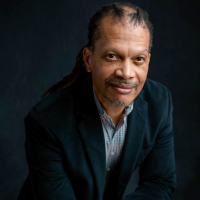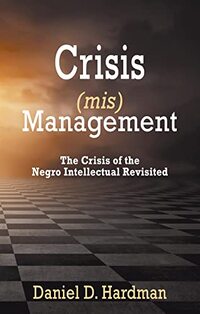Where have you spent most of your childhood?
I was born in Chicago but grew up in Tulsa, OK. My family made many trips back to Chicago and those trips home had a significant impact on my life.
Were you an avid reader as a child?
Yes. Do you still read books? I do but not as much as I did, mostly because I spend more time writing and working full-time.
At what age did you begin writing your first book?
Funny story. When I was about 4, I told my mom I was going to write a book. I always loved writing and words. At the age of 29 or 30, while stationed overseas in Germany, around 1992-1993, I began writing short sermonettes. Those writings formed the source material for my first book, Essays from Church, volume 1 published in 2005, although it was not very well written mostly because I didn’t have an editor to work with. That book became my current work, Crisis (mis)Management – The Crisis of the Negro Intellectual Revisited, that was published in December 2022. I also published a book called The 21st Century Bible in 2019 or so.
How do you create a positive learning environment in your classroom?
I am not a teacher, so I don’t have a classroom.
What inspired you to write the book, Late Bloomer Baby Boomer?
I was inspired to write my first book after reading Harold Cruse’s The Crisis of the Negro Intellectual. Was there a specific event or experience that sparked your idea? Reading that book changed my life by transforming the way I saw myself and thus my community—Black/African America—as well as the way I interacted with both.
What inspired you to write a memoir, and why did you feel that your story was important to share with readers?
This is not a memoir; however, it does contain many personal historical events because those events are part of my lived experiences and help to validate the points I attempt to make in my book.
How did you decide on the structure of your memoir? Did you follow a chronological order, or did you organize it thematically?
No chronological order; simply followed the flow.
Did you have any specific goals or messages that you wanted to convey to readers through your memoir? What were they, and how did you try to achieve them?
Yes. I want those who read my book to take away that oftentimes, Black/African Americans were given choices, options, that were not of their own making thus those choices didn’t reflect the reality in which they lived. Meaning, for all intents and purposes, those choices were false because they served the purposes of those who gave them i.e., white Americans. It is time to create our own choices and options so we can make decisions that truly reflect the needs of our community.
How did your family and friends react to your decision to write a memoir?
It was mostly positive, although some of the areas I discussed were centers of deep sentimental importance, like religion and faith, consequently, they may not be able to fully appreciate my points of view on these topics. Did anyone express concerns or reservations about you sharing personal stories about them? No.
Memoirs often involve a lot of self-reflection and introspection. How did writing your memoir change the way you view yourself and your life experiences?
Again, not a memoir; but I would say that publishing my book reinforced my convictions and helped me see the importance of my story being in the public sphere. I am truly convinced that I am not the only person who feels the way or sees things the way I do. There are others and hopefully by writing about them I’ve encouraged others to share their stories too.
In what ways do you aim to enlighten, entertain and educate with your writings?
By writing out of my personal experiences and doing so in an authentic way. I think that lends a huge amount of credibility and engenders trust in my audience.
What advice would you give to someone who is struggling to accept their sexuality?
Be true to who you are. Don’t follow fads or trends, just be you, to paraphrase a saying, “be you before being you was cool.”
Are there any other humor writers or books that have influenced your writing style?
Not humor, but there are many other writers and books that helped inspire my book, such as Harold Cruse’s Plural but Equal, Bruce Wright’s Black Robes, White Justice, The Autobiography of Malcolm X, A Testament of Hope—The Essentila Writings and Speeches of MLK, The World’s Sixteen Crucified Saviors, and Black Protest, 350 Years of History, Documents, and Analyses by Joanna Grant to name a few.
Do you have any plans to write more books in the future, and if so, what topics or genres are you interested in exploring?
Absolutely. I’m currently working on my next book by the working title Crisis of Compatibility. It will deal with relationships, specifically of the romantic nature.
How has your experience of being associated with AllAuthor been?
My experience has been totally positive. I almost with AllAuthor conducted local meetings so I could make personal connections with other authors.



